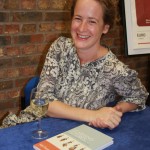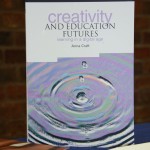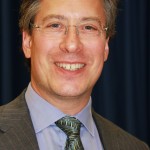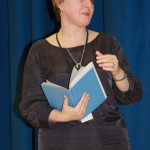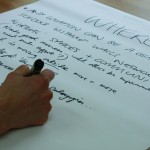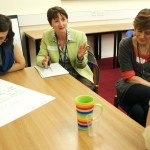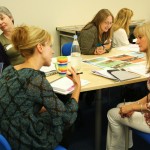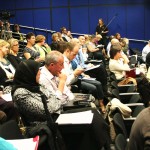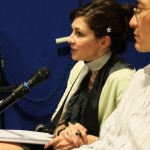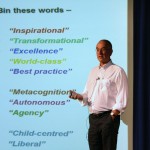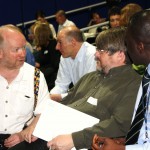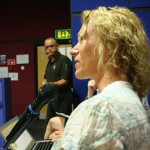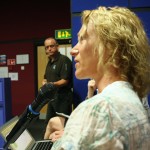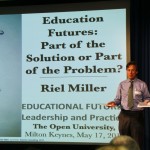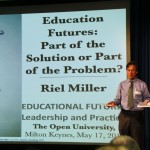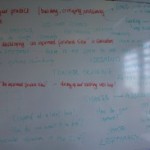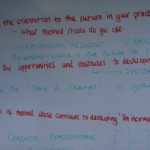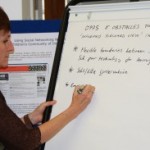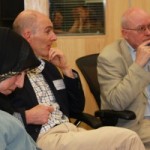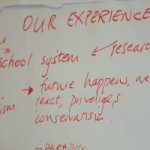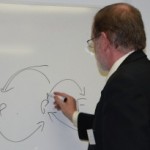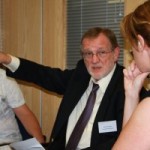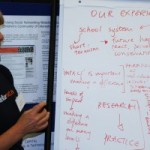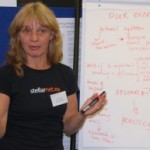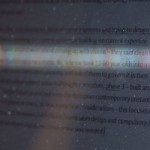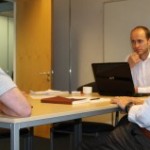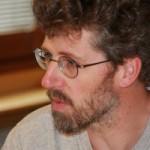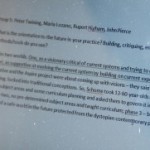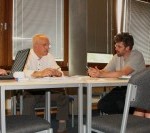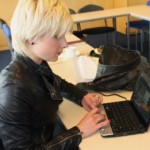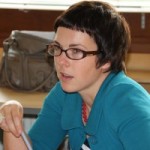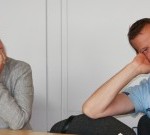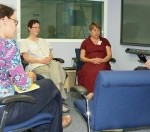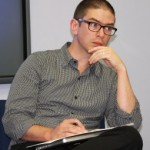1 June 2011, by Rupert
Below are notes taken on Riel Miller’s and Guy Claxton’s keynote speeches:
Education Futures: Part of the Solution or Part of the Problem?
http://www.slideshare.net/edfutures/riel-miller-esrc-futures-open-universitymay172011
and
Constant change is here to stay: why schooling is always about the future
http://www.slideshare.net/edfutures/guy-claxton-esrc-futures-may11
with additional notes from the subsequent question and answer sessions.
Keynote 1: Riel Miller
1. How we think about the world
embracing complexity
- The end of certainty: the future is no longer determined by the present. If so, what is the role of agency? Science now reflects the complexity of a world in which human creativity is an influential actor
- It is the real which makes itself possible, not the possible becomes real.
- The cone of probability/plausibility model is dominant, but flawed; like Copernicus’ model, embracing complexity requires we change what we see, imagine, resist, preserve and how, and changes the conditions of change.
How do we make this view practical?
A) An anticipatory systems perspective
Futures literacy should be ambient strategic thinking – telling anticipatory stories.
Anticipation is part of the system, not a different system B which may or not contain A.
B) Embrace 3 dimensions of imagining the future, each with different methods
3 dimensions:
- contingency (luck);
- optimisation (known goal, rules, resources); this is ‘colonising the future’
- exploration, or imagining the potential of the present.
C) Use learning processes that employ collective intelligence – action research, narrative etc – to challenge assumptions:
To describe imaginary futures we can use a Hybrid Strategic Scenario method. Rigorous imagining, developing analytically rich stories of a functioning society using our narrative a d reframing capacities and our collective intelligence.
When the context is simple and closed, use optimisation; where complex and open, use exploration.
In a Learning Intensive Society Scenario (level 2): incremental radicalism transforms everyday life, in 1 or 2 generations, disrupts institutions and values.
The threat to industry in the modern era provokes fear and thus resistance to change – which is dangerous. The poverty of our imagination is creating desperation. The good news is alternatives are all around us; the question is: can we use these to step out of the industrial model with a transformative way of learning and earning a living.
Systemic Economic Transformation: Changes what and how we produce
The way we imagine the future depends on our tools: An economic tool focuses on production, from mass production to value added to unique creation, through increasing learning intensity. The pinnacle is to become an artist/researcher/learner. Not a ‘genius’ model, but banal, everyday creativity. The example of 3D printing helps us imagine the bypassing by individuals and groups of the hierarchical industrial model.
Murmuration: Example of the flocking starlings. Clouds of unique creation; flows of collaboration and experience, local and global, multiple dynamic communities – heterarchical. Moves towards heterogeneity: the capacity to be free. Move from the large and homogenous to the small and diverse.
Dynamic Governance: making decisions – from limited to open and spontaneous.
From manageable and clarity of goals towards ambiguity and spontaneity.
“More university grads do not increase wealth or competitive advantage”: wealth is no longer industrial; learning by doing and self-knowledge is becoming the primary source of knowledge and value.
2. Reducing classroom schooling helps avoid fundamentalism: custody, behavioural rules, cognitive development, socialisation, screening and sorting
3. In the Learning Intensive Society, wisdom is what counts, so no fear of ageing – the ‘know why’ society.
Transformation: don’t predict – act experimentally and exuberantly in living. With wisdom, creativity, sponteneity, complexity and fluidity.
Questions and Answers:
How, like starlings, do we learn to respond to weak signals?
Simulation is a powerful tool, but not the only answer. If we rely on it we become paralysed. We need exploration as well.
Chaos and strange attractors: The starlings flight is both chaotic and meaningful. How can we find meaningful narratives in the face of an uncertain future?
We in the West have an obsession with immortality and a fear of death and destruction. We must learn to see chaos and destruction as good, despite personal sadness and loss.
The move from one pulse to the next, you say, is smooth; but tangibles are increasingly expensive, as is the difficulty of following the refinement of taste. How do you reconcile this?
There is loss of equality and access. This may have positive potential in that it highlights the flaws in our desired ways of living: the poverty of imagination. I can envisage cheap tangibles against the backdrop of far lower consumption and far greater efficiency. There are many transaction systems that embed the past in the present. The Victorians were wacky and risky; we are in an era of new prudence in the face of fears about the future.
You say we must enact the future by modelling futures, not planning them.
We are good at spontaneity because it’s a way of being of intrinsic value to us. We don’t have to know what future we’re working towards – doing so diminishes or exploratory capacity.
Keynote 2: Guy Claxton
Constant change is here to stay – why schooling is always about the future.
“Education is what societies lay on to equip young people with knowledge, skills, attitudes and values they will need (that their other experiences may not give them) to flourish amidst the risks, demands and opportunities of the future as they imagine it will be.”
We should bear the following in mind when thinking about education and the future:
- it is relative, not timeless
- dependent on accurate imagination
- the future is always uncertain
- we need it now more than most (?)
- religion/authority is less available as a comfort
Predictions of the Apocalypse are nothing new; ‘our world’ is now simply defined more widely than before to encompass the whole planet and its environment rather than the village, country etc.
There’s an old idea that has yet to fulfil its potential. It keeps appearing… and disappearing: the capacity to learn – and for learners to function in situations for which they were not specifically prepared. New Basics, Essential Learnings, Key Competencies, etc are terms built into curricula worldwide, but don’t appear to be ‘sticky’.
We must build in increasingly ambiguous, unclear, open-ended situations to schooling as students gets older – yet we appear to be going the other way. Why are we not at the tipping point yet? Why haven’t we changed pedagogy?
8 Key Features of a robust and practical expansive education:
1. Broadening the goal
- not OR but AND – we can have standards and futures orientation
- it’s hard to achieve escape velocity, as with AfL which has shrunk into a small handful of determinate tools void of futures thinking
- SATs should improve through Building Learning Power, broadening outcomes in the process.
2. Benefits for ALL
- 50% are NOT too unintelligent to win; not selection but inclusion
- practical, manual intelligence often provides a better grounding for flexibility and real-world resilience than academic.
- bright, high-achieving young people are increasingly seeking counselling because they’re not being given the chance to ‘flounder intelligently’. Imposter syndrome: not feeling you deserve to be where you are; ‘pseudo-maturity’ – high achieving but fragile.
3 Strong rationale.
- In the past snake-oil salesmen sold non-research-based models of learning. We need research at all levels in contrast to this.
- “Intelligence is the sum total of one’s habits of mind” (Lauren Resnick) – i.e. acquired and changeable (with the right support)
4. Precision support
- drop the following words: inspirational, transformational, excellence, world-class, best practice, metacognition, autonomous, agency, child-centred, liberal. Many don’t say what they’re up to, and imply the same old game by default.
- instead, say: “How do you teach empathy through history, resilience through writing, or questioning through science?”
- the Tasmanian Curriculum fizzled out due to fuzzy language, dismissed by a handful of politicians
- nail the language down to core pedagogy, or it’ll be washed away as another trendy supplement
5. Infusion
- not add-ons but habit change
- not ‘implementing initiatives’ but ‘growing a culture’
- not quick fixes but gradual embedding
- N.B. You can’t not be teaching dispositions to learning, whether intentionally or not
6. Prioritisation
- focusing on what’s important: teachers
- the levers politicians are pulling on aren’t connected to anything; the fine grain of the classroom matters most. An effective classroom is 4 times more potent than an effective school (Wiliam)
- “the largest effect sizes on students’ achievement occur when teachers become learners”
7. Evaluation and progression
- not hope but evidence: measure what we value, or we will value what you measure
- how do you tell if children’s learning to learn is improving?
8. Strategic Leadership
- readiness for innovation; dissatisfaction with piecemeal approaches
- Support from SLT
- Open staff culture
- ‘tight but loose’ supervision
- time to experiment, safety to make mistakes
- etc
Our gift to young people: confidence
Questions and answers
I’d love to use your ideas with my teachers, but how do you work with the top-down hierarchy in schools?
It’s a real challenge for student teachers, esp in deprived areas. BLP now has a strong local teacher training strand. It’s about getting teachers to examine their practice, and requires courage. Not done individually, but as a learning teacher body.
Trainee’s first thoughts are about, ‘can I do it?’ – they often don’t have the space and confidence to think about how they make students think.
Wasn’t Wiliam clever to talk about ‘effective classrooms’? And how can we ‘crowdsource’ merthods that work?
The Expansive Ed Network is a way for schools and unis to get together to share and learn together. There are easy ways to measure children’s ability to use multiple perspectives.
The word ‘assess’ can raise hairs on your neck. Over-complex scenarios to measure capacities could be horrific – but ways can and must be found.
Uncategorized
12 April 2011, by admin
A one-day conference will be held at The Open University, Milton Keynes, on 17 May 2011 from 10.00 – 16.30 followed by a drinks reception and book launch.
Aimed at teachers, community educators, head teachers and other leaders and innovators involved in imagining futures-oriented provision, there will be a variety of workshops designed to explore what sorts of futures education may need to prepare for, what futures literacies might look like within learning and teaching, and what kinds of changes to education institutions might be needed.
The day will offer a range of keynotes and workshops designed to support educators and leaders explore and respond to potential change.
Confirmed contributors include:
-
Riel Miller, Xperidox Futures Consulting, Paris
-
Professor Guy Claxton, University of Winchester
-
Professor Anna Craft, The Open University and University of Exeter
-
Simon Mauger, Shoshin Ltd
-
Professor Mike Sharples, LSRI, Nottingham University
-
Professor Carey Jewitt, Institute of Education, London University
-
Professor Keri Facer, ESRI, Manchester Metropolitan University
-
Leena Llmola, International Institute for Applied Systems Analysis, Austria
-
Ginny Lunn, Prince’s Trust
-
Helen Beetham and Isabel Carlisle, Transition Network
The event will also see the launch of two books: Creativity and Education Futures: Learning in a Digital Age, Professor Anna Craft (Trentham) and Learning Futures: Education, Technology and Social Change, Professor Keri Facer (Routledge).
The conference is the final event in a series of ESRC sponsored seminars on the theme of educational futures run jointly by Manchester Metropolitan University, London Knowledge Lab, Nottingham LSRI, NIACE, Futurelab and Exeter University.
This conference is free of charge, however places are strictly limited and available on a first come first served basis.
To reserve your place please contact [email protected] or telephone 01908 653277. A number of travel bursaries will be available – contact the organisers for more information.
events
21 September 2010, by Richard
The fourth seminar in the series will be held on November 19th, 2010 at
the London Knowledge Lab, 23-29 Emerald Street, London WC1N 3QS, UK (directions).
This seminar will examine the ethical challenges of attempting to study and intervene in ‘the future’ in education, and the role of futures research in empowering individuals and societies to make change. The day will be divided into speaker sessions and workshop sessions.
To register for this seminar please contact Barbara Ashcroft. The programme for the day is as follows:
| 10.00 |
Registration and tea/coffee |
| 10.15 |
Welcome |
| 10.30 |
The Virtual Society in the Big Society: Building an ethical future for education in Digital Britain
Professor Andy Miah, University of the West of Scotland
Over the next five years, educational opportunities will continue to expand beyond formal pedagogic institutions, with more cross-sector partnerships delivering co-curated, community based educative experiences. In part, this will be made possible by the creative use of digital technologies, which will streamline information systems, engage people on new learning practices and forge a new context within which education is remade. However, these trends will also pose difficult ethical challenges about how education should take place, in a distributed, networked environment. This talk will discuss what ethical issues arise from the increased utilization of digital environments within educative practices.
|
| 11.45 |
Break |
| 12.00 |
Alternative futures
Professor Michael Fielding and Professor Peter Moss, Institute of Education
What is education, what is it for and what are its fundamental values? How do we understand knowledge and learning? What is our image of the child and the school? How does the ever more pressing need to develop a more just, creative and sustainable democratic society affect our responses to these questions? Addressing these fundamental issues, Fielding and Moss contest the current mainstream dominated by markets and competition, instrumentality and standardisation, managerialism and technical practice. They argue instead for a radical education with democracy as a fundamental value, care as a central ethic, a person-centred education that is education in the broadest sense, and an image of a child rich in potential.
|
| 13.00 |
Lunch |
| 13.45 |
Bioscience, bioethics and hybrid educational futures
Dr Alexandra Plows, University of Bangor
This presentation will give an overview of emerging technologies, research directions and applications in bioscience such as hybrid embryos, genetic testing, pharmacogenomics, Converging Technologies (nanobio, synthetic biology), summarising some associated bioethical issues. In providing a narrative of key examples drawn from recent sociological research, the talk will address how a new discipline emerges and dominates the education agenda so that it not only drives research and education, but becomes a new imperative, paradigm, and unavoidable tool for thinking. Developments in bioscience and its funding pathways are catalysing new areas of study, through the hybridisation of previously separate disciplines (such as physics, biology, computing). This has lead to the creation and/or development of new sub-disciplines (bio infomatics, science communication, bioethics) and is casting new light on established ones (for example, the significance of developments in reproductive technologies for women, and hence for feminism). Interdisciplinarity is thus key to an understanding of how bioscience has and will impact on education. The innovation imperative and the ‘bio-economy’ are also catalysing change in educational practice, for example via the melding of public/private research in what Glasner and Rothman (2004) term ‘co-laboratories’; assemblages of ‘big pharma’, UK funding councils and university labs.
|
| 14.45 |
Workshop: Ethics and futures
Nagat Betar, Sarah Dyke, Margo Greenwood and Rupert Higham
This workshop will provide an opportunity to engage with key issues for futures and ethics including gender and ethnicity, notions of ‘time’, the problematic of advocacy and ethics, of assessment and grading, values and skills.
|
| 16.00 |
Discussion: Towards an Educational Futures Manifesto
Professor Keri Facer, Manchester Metropolitan University
|
| 16.30 |
Close |
The ESRC funded ‘Educational Futures Seminar Series’ is run jointly by the Education and Social Research Institute, MMU; Graduate School of Education, Exeter University; London Knowledge Lab; LSRI, Nottingham University; NIACE; Futurelab.
events
